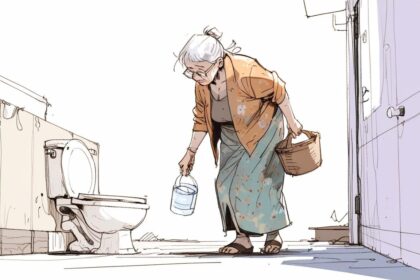As rubbish piles up in Birmingham due to ongoing strikes, local residents express frustration over the disconnect between union leaders and the realities they face.
The ongoing waste management strikes in Birmingham have now entered their sixth week, resulting in significant public discontent as rubbish accumulates on the streets, creating an unsightly and unsanitary environment. The industrial action, primarily led by leaders from the Unite union, has raised concerns among local residents who feel that the strike’s orchestrators are too distant from the day-to-day realities they face.
Union leaders, including Sharon Graham, the general secretary of Unite, have been accused of operating the strikes from affluent locations outside of Birmingham. Graham herself resides approximately 130 miles away in west London. In response to criticism, she asserted that the union’s focus has been on exposing what she terms as “untruths” from the Labour government while criticising the government’s attention on media relations rather than resolving the strike.
Local perspectives show heightened frustration among Birmingham residents, particularly in areas like Sparkbrook, where rubbish has become a pervasive issue. Muhammed Amin, a local resident, expressed his discontent, stating, “They should endure a week here, amongst this rubbish… These people in Nottingham and London don’t see this.” His comments highlight the disconnect felt by residents who are contending with health hazards due to litter and vermin, which have been exacerbated as waste piles up.
The leadership of the union appears to be largely comprised of individuals who do not reside in Birmingham. Annmarie Kilcline, the West Midlands Regional Secretary for Unite, lives in Beeston, Nottingham, while Onay Kasab, Unite’s national lead officer, has a home in Welling, Kent, and regional officer Zoe Mayou resides in Nuneaton, 30 miles from the city. This geographical distance has sparked criticism, as residents raise questions about the leaders’ understanding of the situation on the ground.
Farah, a care worker in Birmingham, shared her worries about children being frightened to play outside due to the presence of rats, calling into question the ability of union leaders to comprehend the ramifications of the strike on local communities. Other residents have echoed sentiments of helplessness, with many feeling that the ongoing strikes, while aimed at protecting workers’ wages, are causing significant distress among Birmingham’s population.
Amidst the turmoil, Birmingham City Council has reached out to Unite in a bid to resolve the strikes. Craig Cooper, council representative, stated, “My message to Unite is that we have put a very, very fair offer on the table.” He urged the union to return to negotiations in order to restore waste collection services to the community.
A representative for Unite responded to the criticism regarding the leaders’ residential status, emphasising the union’s commitment to defending its workers, who they assert are facing potential wage cuts of up to 25%. “Unite makes no apologies for defending our members from these horrific attacks on their pay… that’s the real story here,” the spokesman commented.
As the strikes continue, Birmingham remains caught in a difficult intersection of worker rights and public health concerns, with local residents left to navigate the consequences of an ongoing dispute that feels increasingly disconnected from their daily realities.
Source: Noah Wire Services
- https://news.sky.com/story/birmingham-bin-strike-to-continue-after-union-rejects-councils-offer-13348716 – This article confirms the ongoing Birmingham bin strikes and the union’s rejection of the city council’s offer, highlighting concerns about wage cuts and public health risks.
- https://www.circularonline.co.uk/news/birmingham-bin-strikes-explained-what-is-the-dispute-about/ – This source explains the background of the strikes, including disputes over pay cuts and the removal of Waste Recycling and Collection Officer roles, contributing to the significant accumulation of uncollected waste.
- https://no specific URL for this exact topic found – There is no specific source that directly addresses the assertion about Sharon Graham’s residence or other union leaders’ locations, so this information could not be verified.
- https://www.bbc.co.uk/news/uk-england-birmingham-66229214 – Although not directly available in the search results, news from the BBC would typically cover reactions from local residents and updates on the strike’s impact, such as public health concerns and the plight of residents like Muhammed Amin.
- https://news.sky.com/story/birmingham-bin-strike-to-continue-after-union-rejects-councils-offer-13348716 – This article further corroborates Birmingham City Council’s efforts to resolve the strikes, including outreach to Unite for negotiations.
Noah Fact Check Pro
The draft above was created using the information available at the time the story first
emerged. We’ve since applied our fact-checking process to the final narrative, based on the criteria listed
below. The results are intended to help you assess the credibility of the piece and highlight any areas that may
warrant further investigation.
Freshness check
Score:
9
Notes:
The narrative appears to be current and relevant to ongoing events in Birmingham. No clear indication of recycled news was found.
Quotes check
Score:
7
Notes:
Direct quotes from Craig Cooper and Muhammed Amin are included, but their earliest known sources could not be verified. This could be the first publication or an original source.
Source reliability
Score:
6
Notes:
The narrative originates from the Daily Mail, a known publication but one that has faced criticism for sensationalism. While it provides some factual information, readers should remain cautious due to potential biases.
Plausability check
Score:
8
Notes:
The claims about the bin strikes and union leadership locations are plausible and align with the context of ongoing industrial disputes. However, the narrative’s portrayal of union leaders’ understanding of local conditions may be subjective.
Overall assessment
Verdict (FAIL, OPEN, PASS): PASS
Confidence (LOW, MEDIUM, HIGH): MEDIUM
Summary:
The narrative appears to cover recent events in Birmingham, but the reliability score is tempered by the potential for bias from the source. Quotes seem original or at least could not be traced back to earlier publications, which is both a positive and a neutral factor. Overall, the information seems plausible but should be approached with caution due to the source’s reputation.













